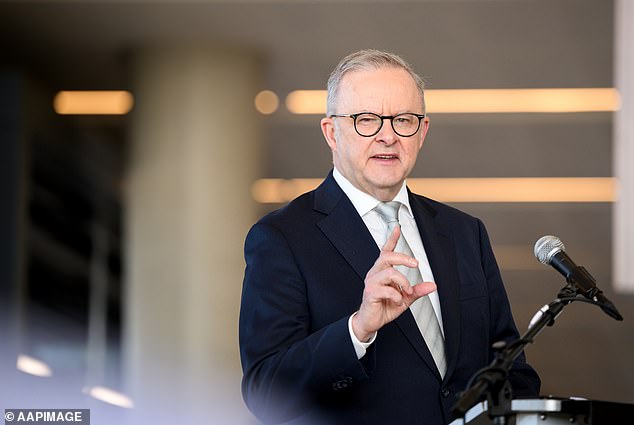
Anthony Albanese and other politicians are set to receive a pay rise at a time many Australians are struggling financially, with the Prime Minister’s salary lifting from around $607,471 to over $622,000.
Federal politicians, senior public servants and departmental secretaries will receive a ‘relatively modest’ 2.4 per cent pay rise from July 1.
This is thanks to a Remuneration Tribunal ruling putting pay rises in line with inflation.
Albanese will see his salary rise by $15,000, while Treasurer Jim Chalmers will see his lift from $438,111 to $448,625.
Opposition Leader Sussan Ley’s salary will jump to $442,643, while backbenchers will see their salary increase from around $233,660 to $239,267.
But it is lower than the Fair Work Commission’s annual wage review, which determined a 3.5 per cent above inflation increase to the minimum wage.
‘The tribunal notes the domestic economy is continuing to stabilise following a period of elevated inflation and that many Australians continue to experience financial challenges,’ the tribunal noted.
‘In the current economic context, the tribunal considers an increase of 2.4 per cent appropriate.’

This pay rise, which will see Anthony Albanese’s salary rise by $15,000, is in line with the inflation figure for March
‘This adjustment reflects a measured approach, balancing the need for restraint given economic conditions with the recognition of the upward pressure on household costs.’
The tribunal, which is an independent body that determines the pay of federal politicians and public servants, said it had a longstanding policy of ‘modest’ increases in pay for politicians and bureaucrats.
‘Including the current decision, the cumulative total of remuneration increases awarded by the tribunal since 2016 amounts to 18.65 per cent,’ it said.
‘In contrast, remuneration increases more generally in the public and private sectors (based on overall March WPI data from 2016 – 2025) equate to 25.6 per cent.’
Former Liberal Democrats senator David Leyonhjelm, a libertarian campaigning for smaller government, said Australia’s high pay for politicians produced careerists without life experience outside politics.
‘It turns politics in Australia into a career, a well-paid career,’ he told Daily Mail Australia.
‘I don’t think taxpayers get good value for money but the big thing is that many of the incumbents in those roles can’t do as well outside of politics so they have an additional incentive to hold on to their jobs, hold on to their positions in order not to lose the benefits.
But Warren Snowdon, a former federal Labor minister who was in Parliament for 33 years, said politicians work hard and deserve the money.
‘I won’t comment on the money but I think it’s a fallacy they don’t work hard,’ he told Daily Mail Australia.
‘I don’t know of one member of Parliament that doesn’t work hard.
‘In my own case, I was in the Parliament for almost 33 years and for most of that time, I was at home, on average, eight nights a month, if you exclude the Christmas period.
‘I had to travel inside the electorate which was 1.3million square kilometres, very diverse communities; you can’t be seeing yourself as someone who’s an absent member.’
But Mr Leyonhjelm, who was in the Senate for five years, said too many politicians were addicted to the pay and the perks.
‘I subscribe to the latter view that you’re not in it for the money, it’s not a career and you should have a life before you go into politics, you should have a life after you come out of politics so that you don’t lose touch with what you’re there for and the people you represent,’ he said.
‘You can get into a philosophical argument here – is politics a profession, a calling or should it be people who spend a few years serving the public and go back to a normal life?’
‘We should treat a political role as a temporary position no matter who you are.’
While Australia’s most senior politicians are well paid by international standards, their remuneration packages are only a small fraction of what Australia’s top bureaucrats get.
‘It’s high by international standards, it’s low by bureaucratic standards,’ Mr Leyonhjelm said.
‘So then the argument becomes – “Should the Prime Minister be paid more or less than the bureaucrats who are basically at his bidding?”‘
Reserve Bank of Australia Governor Michele Bullock is on a total remuneration of $1.057million from a base salary of $811,108.
Treasury Secretary Steven Kennedy is paid $959,257, on top of a base salary of $816,296.
But corporate chief executives are paid considerably more than Cabinet ministers or departmental bosses.
Commonwealth Bank CEO Matt Comyn is on $8.977million with bonuses, on top of his base salary of $2.5million.
Thousands of Aussies have still called for politician’s pay to be based on perfomance.
‘Imagine if they got paid on performance,’ one said.
‘Results based remuneration is the most appropriate form of remuneration for politician,’ another added.
‘It should be performance based – a huge deduction is warranted,’ a third declared.
HOW MUCH SENIOR POLITICIANS WILL GET:
Anthony Albanese: $622,097
Jim Chalmers: $448,628
Richard Marles: $490,499
Penny Wong as Leader of Government in the Senate: $448,628
Tony Burke as Leader of the House: $418,719






